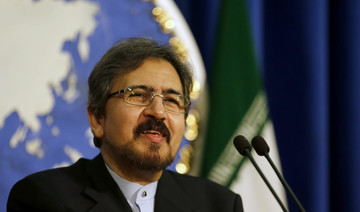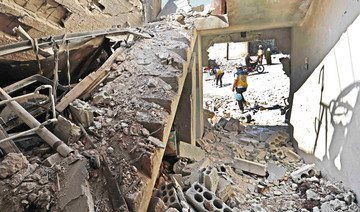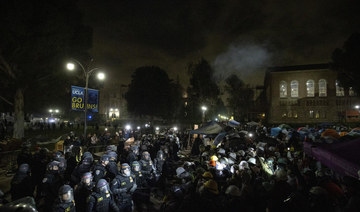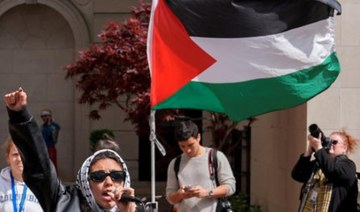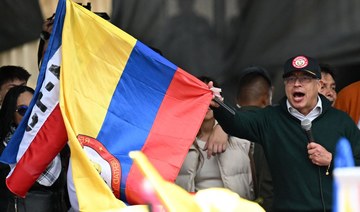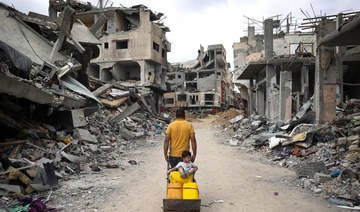TEHRAN: Just one shop among the thousands in Tehran’s sprawling Grand Bazaar can offer a tableau of the darkening mood descending across Iran as American sanctions again take hold.
A salesman who wants to move to Europe for a better life shows off his pots and pans to a mother now struggling to pay for the gifts she wanted before her daughter’s marriage amid the collapse of Iran’s rial currency. Another salesman loudly blames internal politics and corruption for the country’s woes. Muttered curses and even shouts against the government follow the journalists talking to them.
While only a small moment in a nation of 80 million people, it shows the dangers ahead for the government of the relatively moderate President Hassan Rouhani. His signature nuclear deal with world powers now has become a noose around his neck that hard-liners gleefully tighten. Meanwhile, the sporadic and leaderless protests the nation has seen over its worsening economy threaten to roar back to life at any time.
That has many expecting the worst is yet to come.
“It has become more difficult, but we need to lower our expectations,” said Kiana Ismaili, 26, shopping ahead of her wedding.
For centuries, Iran’s bazaar has been the beating heart of both its economic and political life. While some now go to the Western-style mega-malls of Tehran’s tony northern suburbs, the Grand Bazaar’s narrow alleys, cramped stalls and wandering musicians still draw crowds of thousands.
Strikes in Iran’s bazaar also have served as political bellwethers.
Bazaar families opposed the Iranian Shah Mohammad Reza Pahlavi and supported the 1979 Islamic Revolution that saw him replaced by the Shiite theocracy and elected officials. More recently in June, protesters swarmed Tehran’s Grand Bazaar and forced shopkeepers to close their stalls, apparently in anger over the rial dropping to 90,000 to the US dollar on the black market despite government attempts to control the currency rate.
The rial in the meantime has dropped as much as 150,000 to $1 with many anticipating further drops as the US restores punishing sanctions on Iran’s crucial oil industry in early November. The Trump administration denies it is seeking to overthrow Iran’s government through the economic pressure, though Iranian officials say the link between the two is clear.
Fear over the economy has brought many to the Grand Bazaar in recent days to buy what they can before their savings further dwindle away.
“People are buying more because they think they won’t be able to buy stuff with current prices anymore. They are worried about price fluctuations,” said Omid Farhadi, a 25-year-old sales clerk at the kitchenware shop Zomorrod, or “Emerald” in Farsi.
“You have no price stability in this country. You go to bed and overnight a car that was worth 100 million rials is now worth 140 million.”
As shoppers looked over his pots and pans, Farhadi said he hoped to immigrate soon to the Netherlands. He said other young Iranians with the financial means want to leave the country as well, while those without, longingly look at life in Europe.
Farhadi largely blamed Iran’s poor relations with the rest of the world for the faltering economy.
That’s spearheaded by President Donald Trump’s decision to pull America out of the 2015 Iran nuclear deal, which saw Iran agree to limit its enrichment of uranium in exchange for the lifting of economic sanctions. While the United Nations repeatedly has said Iran complies with the accord, Trump said he wanted a stricter deal that also constrained Iran’s ballistic missile program and its foreign policy while permanently limiting its atomic program.
While Iranians remain angry at Trump over adding them to his travel ban and pulling out of the deal, many feel even angrier at their own government. That’s due to a steady stream of corruption cases and allegations of mismanagement by officials.
Farhadi’s colleague at the shop made a point to tell visiting Associated Press journalists he believed Iran’s main problem lay with Rouhani’s administration. The government’s management of Iran’s economy, already hobbled by high unemployment, growing inflation and debt-laden banks, also faces widespread criticsm.
“Ninety percent of our problems are because of the infighting,” said salesman Alireza Alihosseini. “I don’t know why but the government and the supreme leader have differences. Only 10 to 5 percent is because of America.”
The mother of Ismaili, the young woman shopping ahead of her wedding, then came up and asked to talk as well. She spoke carefully about how Iran has faced sanctions and international pressure in the nearly 40 years since the 1979 Islamic Revolution, calling the recent pressure nothing new.
Men listening to her speak then started muttering, some cursing her loudly for her comments. A man in the market, who requested anonymity for fear of reprisals for his criticism of the government, put his blame squarely on those in charge of the country.
“For someone like me, a young man, if I’m hungry and I don’t have a job I’ll turn into a thief. I’ll turn into a vampire,” he warned.
Elsewhere in the market, some even defended Trump, like Mahdirashid Mohammadzadeh, whose small stall in the jewelry section of the bazaar has seen customers eagerly buying gold as a hedge against the falling rial.
“Once we made peace with Obama, we were never so cheap,” he said.
Asked what caused the economic woes, Mohammadzadeh blamed Iran’s costly foreign intervention in Syria.
“This is the people’s money,” he said. “We have done nothing wrong to deserve this, but they are sending all our money to Syria.”
Unease, anger in Tehran as economy worsens
Unease, anger in Tehran as economy worsens
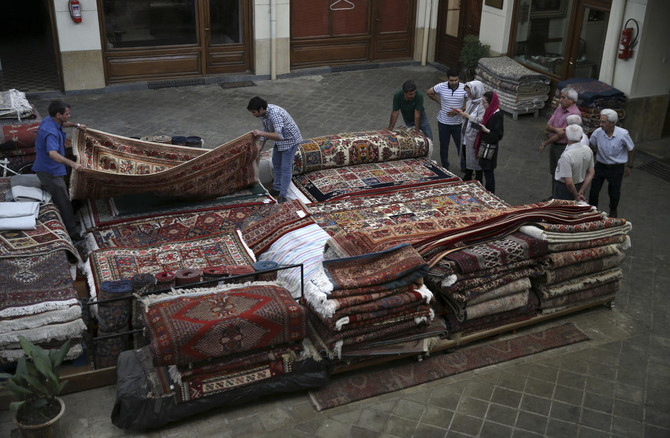
- The rial has dropped as much as 150,000 to $1 with many anticipating further drops
- Iranians blame their own government over the economic conditions
Houthi leader vows ‘fourth phase’ of Red Sea ship attacks
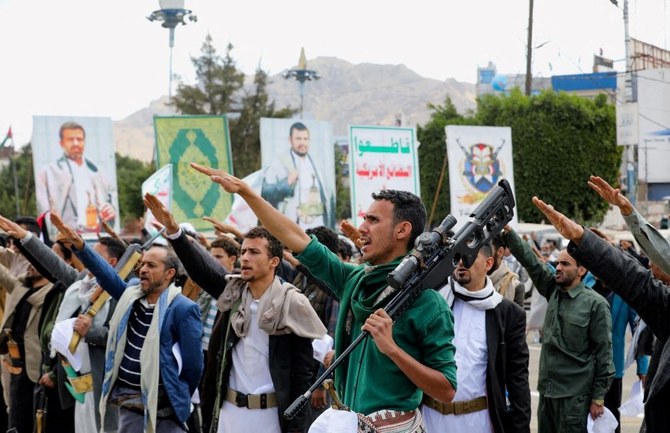
- Abdul Malik Al-Houthi: ‘We are preparing for a fourth round of escalation if the Israeli enemy and the Americans continue their intransigence’
- Al-Houthi said that 452 attacks by US and UK armies on militia-controlled regions had killed 40 people and injured 35 others since January
AL-MUKALLA: The leader of the Houthi militia vowed to escalate attacks on ships in the Red Sea until Israel ends its war in Gaza and the US stops attacking Yemen.
“We are preparing for a fourth round of escalation if the Israeli enemy and the Americans continue their intransigence,” Abdul Malik Al-Houthi said in a televised speech on Thursday.
Al-Houthi said that his forces launched 606 ballistic missiles and drones against 107 Israeli, US, and UK ships in the Red Sea, Bab Al-Mandab Strait, Gulf of Aden, and recently in the Indian Ocean during the Red Sea ship campaign that began in November.
In the last seven days alone, the Houthis have fired 33 ballistic missiles and drones at six ships in international seas off Yemen’s coast, as well as Israel’s city of Eilat.
Al-Houthi said that 452 attacks by US and UK armies on militia-controlled regions had killed 40 people and injured 35 others since January.
His warning came after the militia’s media said on Thursday that the US and UK carried out five airstrikes on Hodeidah airport in the Red Sea’s western city of Hodeidah.
On Tuesday, the US carried out another strike on the port of Al-Saleef in Hodeidah after the US Central Command reported its troops stopped a Houthi assault with a drone boat on the same day.
The Houthis have seized a commercial ship, sunk another, and launched hundreds of missiles and drones at international navy and commercial ships in the Red Sea since November, claiming to be in support of Palestinians and pressuring Israel to cease its war in Gaza.
As a response to the attacks, the US formed a coalition of marine forces to protect the Red Sea.
It also launched strikes on Houthi targets in Sanaa, Saada, Hodeidah, and other Yemeni areas controlled by the Houthis.
Turkiye’s Erdogan criticizes US crackdown on college protests
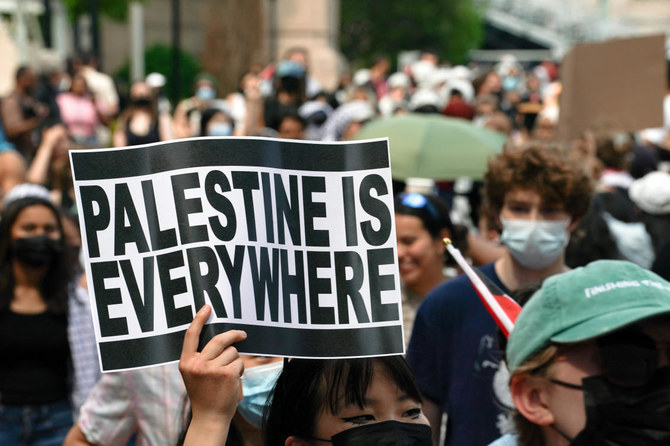
- “Conscientious students and academics including anti-Zionist Jews at some prestigious American universities are protesting the massacre (in Gaza),” Erdogan told an event
- “These people are being subjected to violence, cruelty, suffering, and even torture for saying the massacre has to stop“
ANKARA: Turkish President Tayyip Erdogan waded into the debate over US college campus protests on Thursday, saying authorities were displaying “cruelty” in clamping down on pro-Palestinian students and academics.
Demonstrations have spread on campuses across the United States over Israel’s conduct of the war in Gaza, prompting police crackdowns and arrests at some venues such as Columbia University in New York.
“Conscientious students and academics including anti-Zionist Jews at some prestigious American universities are protesting the massacre (in Gaza),” Erdogan told an event in Ankara.
“These people are being subjected to violence, cruelty, suffering, and even torture for saying the massacre has to stop,” he said, adding that university staff were being “sacked and lynched” for supporting the Palestinians.
Turkiye, a NATO ally of the United States, has sharply criticized Israel’s assault on Gaza and what it calls the unconditional support it receives from Western countries.
The US is a top supplier of military aid to Israel and has shielded the country from critical United Nations votes.
“The limits of Western democracy are drawn by Israel’s interests,” Erdogan said. “Whatever infringes on Israel’s interests is anti-democratic, antisemitic for them.”
More than 34,000 people have been killed in Gaza during Israel’s nearly seven-month military offensive, Palestinian health officials say, after Hamas militants killed some 1,200 people and took 253 hostages during an Oct. 7 assault on southern Israel, according to Israeli tallies.
Israel president says US universities ‘contaminated by hatred, anti-Semitism’

- “We see prominent academic institutions, halls of history, culture, and education contaminated by hatred and anti-Semitism fueled by arrogance and ignorance,” he said
- “We watch in horror as the atrocities of October 7th against Israel are celebrated and justified“
JERUSALEM: Israel’s president on Thursday slammed US universities for campus unrest over Israel’s war in Gaza, saying these institutions were “contaminated by hatred and anti-Semitism.”
Isaac Herzog said in a special broadcast that he was issuing an urgent message of support to Jewish communities amid a “dramatic resurgence in anti-Semitism and following the hostilities and intimidation against Jewish students on campuses across the US in particular.”
“We see prominent academic institutions, halls of history, culture, and education contaminated by hatred and anti-Semitism fueled by arrogance and ignorance,” he said.
“We watch in horror as the atrocities of October 7th against Israel are celebrated and justified.”
His comments came as hundreds of police and protesters were in a tense stand-off at the University of California, Los Angeles and unrest over Israel’s war against Hamas in Gaza continued to spread in campuses across the United States.
Demonstrators have gathered in at least 30 US universities since last month, often erecting tent encampments to protest the soaring death toll in the Gaza Strip.
Israel’s offensive in Gaza has killed at least 34,596 people in Gaza, mostly women and children, according to the Hamas-run territory’s health ministry.
It comes in response to Hamas’s unprecedented attack on Israel on October 7, which resulted in the deaths of 1,170 people, mostly civilians, according to an AFP tally of Israeli official figures.
The militants also took about 250 hostages, 129 of whom remain in Gaza, including 34 presumed dead, Israel says.
The protests against the war have posed a challenge to US university administrators trying to balance free speech rights with allegations of criminal activity, anti-Semitism and hate speech.
In his statement Thursday, Herzog said his message was addressed “to our friends on campuses and in Jewish communities across the United States and all over the world.”
“The people of Israel are with you. We hear you. We see the shameless hostility and threats. We feel the insult, the breach of faith and breach of friendship. We share the apprehension and concern,” he said.
“In the face of violence, harassment and intimidation, as masked cowards smash windows and barricade doors, as they assault the truth and manipulate history, together we stand strong,” he said.
“As they chant for intifada and genocide, we will work — together — to free our hostages held by Hamas, and fight for civil liberties and our right to believe and belong, for the right to live proudly, peacefully and securely, as Jews, as Israelis — anywhere.”
Pointing to Holocaust Memorial Day commemorations next week, the Israeli president said “we will speak of the dark times of the past, and we will remember the miracle of our rebirth.”
“Together, we shall overcome,” he said. “In the face of this terrifying resurgence of anti-Semitism: Do not fear. Stand proud. Stand strong for your freedom.”
Palestinian Embassy seeks temporary status for Gazans who entered Egypt during war

- Diab Al-Louh stressed that residency permits would only be for legal and humanitarian purposes
- Displaced Palestinians in Egypt lack papers to enrol their children in schools, open businesses or bank accounts, travel, or access health insurance
CAIRO: The Palestinian Embassy in Egypt is seeking temporary residency permits for tens of thousands of people who have arrived from Gaza during the war between Israel and Hamas, which it says would ease conditions for them until the conflict is over.
Diab Al-Louh, the Palestinian ambassador in Cairo, said as many as 100,000 Gazans had crossed into Egypt, where they lack the papers to enrol their children in schools, open businesses or bank accounts, travel, or access health insurance — though some have found ways to make a living.
Louh stressed that residency permits would only be for legal and humanitarian purposes, adding that those who arrived since the war began on Oct. 7 had no plans to settle in Egypt.
“We are talking about a category (of people) in an exceptional situation. We asked the state to give them temporary residencies that can be renewed until the crisis in Gaza is over,” Louh told Reuters in an interview.
“We have confidence that our Egyptian brothers will understand this. They have already provided a lot,” he said. “But ... this is an issue of sovereignty being discussed at the highest level.”
Egypt’s State Information Service did not immediately respond to a request for comment.
Egypt has been vocal in its opposition to any mass displacement of Palestinians from Gaza, framing this as part of wider Arab rejection of any repeat of the “Nakba,” or “catastrophe,” when some 700,000 Palestinians fled or were forced from their homes in the war surrounding Israel’s creation in 1948. Palestinian leaders also reject settlement of their people in foreign countries.
During the current war, the Rafah Crossing on the 13-km (8-mile) border between Egypt’s Sinai Peninsula and Gaza has been an entry point for aid deliveries, and has also remained largely open for passenger traffic.
But departures from Gaza, already strictly controlled before the war, have been limited to medical evacuees, foreigners and dual nationals, and Palestinians who pay fees to a company called Hala owned by a prominent Sinai businessman.
‘Things are tough’
Those leaving also need security clearance from Israel and Egypt, which together have upheld a blockade on the enclave since Hamas took power there in 2007.
“We are speaking of 100,000 who are looking forward to the day they can come back to Gaza ... maybe once a truce is reached or the war is ended,” said Louh, a Palestinian Authority official who is himself from Gaza.
“But until this happens, people need to correct their legal status.”
The embassy had already helped facilitate passage for some families to return to Gaza during the war, Louh said. Some Palestinians, including visitors and students enrolled at Egyptian universities, became stranded in Egypt when the war started.
Tens of thousands of Palestinians are thought to have settled after 1948 in Egypt, though numbers were lower than in Jordan, Lebanon and Syria, where the United Nations set up refugee camps. As rules granting Palestinians equal rights to Egyptians were rescinded from around the time of Egypt’s 1978 peace accord with Israel, Palestinians say they experienced increasing difficulties in obtaining documents.
The embassy’s efforts to help Gazans in Egypt have been complicated by a lack of funds and staff. The Palestinian Authority, which has limited autonomy in the occupied West Bank, has been hit by drop in international donor funding and Israel’s withholding of tax revenues it collects on behalf of Palestinians.
“Things are tough, dangerous, and they could become more dangerous,” Louh said, referring to the possibility of a major Israeli incursion into Rafah, where more than a million Gazans have sought shelter near the border with Egypt.
Rebuilding bombed Gaza homes may take 80 years, UN says

- If construction materials are delivered five times as fast as in the last crisis in 2021, re-construction could be done by 2040
- Palestinian data shows that around 80,000 homes have been destroyed
GENEVA: Rebuilding Gaza’s shattered homes will take at least until 2040 but could drag on for many decades, according to a UN report released on Thursday.
Nearly seven months of Israeli bombardment have caused billions of dollars in damage, leaving many of the crowded strip’s high-rise concrete buildings reduced to heaps, with a UN official referring to a “moonscape” of destruction.
Palestinian data shows that about 80,000 homes have been destroyed in a conflict triggered by Hamas fighters’ deadly attacks on southern Israel on Oct. 7. Israeli strikes have killed tens of thousands of Palestinians.
In a best-case scenario in which construction materials are delivered five times as fast as in the last Gaza crisis in 2021, rebuilding destroyed homes could be done by 2040, a building assessment said.
But the UN Development Programme assessment notes that Gaza would need “approximately 80 years to restore all the fully destroyed housing units” under a scenario assuming the pace of reconstruction follows the trend of several previous Gaza conflicts.
A separate report based on satellite images analyzed by the United Nations showed that 85.8 percent of schools in Gaza had suffered some level of damage since Oct. 7. Over 70 percent of schools will require major or full reconstruction, the UN statement added.
The UNDP assessment makes a series of projections on the war’s socioeconomic impact based on the duration of the current conflict, projecting decades of suffering.
“Unprecedented levels of human losses, capital destruction, and the steep rise in poverty in such a short period of time will precipitate a serious development crisis that jeopardizes the future of generations to come,” said UNDP Administrator Achim Steiner in a statement.
In a scenario where the war lasts nine months, poverty is set to increase from 38.8 percent of Gaza’s population at the end of 2023 to 60.7 percent, dragging a large portion of the middle class below the poverty line, the report said.


